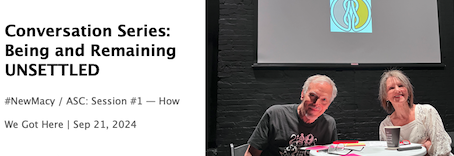
Today I went to the first followup dialogue on what will be a five part series with Paul Pangaro and Patricia Clough on subjects related to cybernetics. The first, occurred during the 60th American Society of Cybernetics (ASC) conference in Washington DC this past summer.
Today’s discussion expanded on the topics presented during the first session. Focusing on the presenters’ early experiences of being introduced to cybernetic thinkers and doers. In this session Patricia elaborated on her experiences at the Biological Computer Lab (BCL) in the 1970s where she met Heinz von Foerster, Humberto Maturana, Herbert Brün, and many other cybernetic thinkers at the University of Illinois in Urbana.
Here are some of my thoughts provoked by their presentation.
Themes: knowing power Politics Reality Cognition
Regarding Patrica’s comment about sitting in a classroom while literally Humberto Maturana generated his theories on the biology of cognition, autopoiesis and reality. I thought about how, later in life, Maturana chose not to talk about autopoiesis, which he considered to be misused by many, but instead speak about the biological-cultural matrix of any living system, including humans.
Patricia also talked about the domain of distinctions in which we humans live, while coupling in our medium, (embodiment) and how this systemic (organism and its environment) thinking is an starting point for understanding anything.
Anything is something…. – Gertrude Stein
It reminded me of how this bio/cultural matrix for explaining living is so difficult to grasps and practice in our language space since we live immersed in cultures of languaging (networks of conversation) that separates the body from the mind — the mind from the environment – the organism from its medium. Generating false narratives that have perpetuated our thinking for centuries now. Hegemonic ideas that Mary Catherine Bateson referred to as our erroneous ways of thinking about thinking, knowing and being human. Ideas that cybernetic metaphors attempt to correct.
No wonder so many people dismiss cybernetics! – Mary Catherine Bateson
in retrospect, an historical coupling in the domains where all distinctions, explanations emerge, which requires a cognitive adaptation that entails not only assimilation but accommodation as well. (Lombardi, 2020)
Question is how does one provoke an adaptation open to generating accommodations? How. Some say the arts are our best bet. Then there is performance.
Language – the human relational domain of descriptions, explanations, including the mathematical logics all that guides our thinking, doing, explaining. then there is the domain of relations related to experience — in doing — dynamics, the unexplainable!
Not top down or bottom up but a mutal modulation please.
I was reminded of how Gregory Bateson preferred to use the word inequality rather than power, and how, some say, his distaste for using the term was significant in his departure from the family therapy community. (Kenney)
Technology was also a subject of discussion as related to the BCL use of technology as a tool. I thought of my favorite definition for the term which was provoked by Pangaro wanting a new kind of technology, a technology nested in conversations (not communications) that generates insights rather than sending signals. How insightful.
General comments triggered today:
- The opposite of linear – circularity.
- How a second-cybernetics entails each I’s responsibility.
- Responsibility for what each I one makes, creates, designs.
- von Foerster’s distinction between a trivial and non-trivial system.
- How I knows. -epistemology! Then there is ontology – knowing we share.
- A triadic relationship I long to explore: cognition, epistemology, ontology.